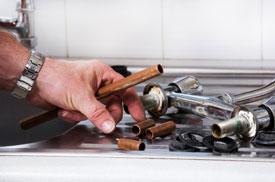When restaurateurs, and others, in the food service industry are looking for ways to save money, all too often, those savings can be found in areas that are being neglected in-house. Say, what? That’s right, those big pieces of equipment in your kitchen need to have routine maintenance and cleaning, or they’ll breakdown. In fact, many equipment repair companies prefer to come into a kitchen that has been maintained throughout the year, because it’s easier to do big fixes – which means savings for you too. And once equipment gets to the point that it’s no longer running, you’re already out a lot more than you would have been if you would have kept up with routine maintenance.
When equipment is maintained throughout the year, it lasts longer. Condenser and evaporator coils on refrigeration units will build-up dust and grease, and if the mess isn’t cleaned up on a weekly basis (for most food service businesses), you’ll likely end up with broken equipment much sooner than you desired. And it’s not just the equipment you need to worry about. Of course, that’s where you’ll see the majority of savings coming back to you, but there are plenty of other areas throughout your business that can save you money. Let’s take the chairs and tables throughout the dining room for example, when’s the last time you made sure the screws and hardware were secure? What do you think a fall from a customer would cost you if a chair wasn’t thoroughly checked over at least once a quarter?
Maintenance Tips
These lists of routine restaurant maintenance tips aren’t necessarily a go-to-resource for every business, because every business, like every piece of equipment, has needs specific to the way they operate. However, what you can count on every time, is the owner/ operator manual that came with each piece of equipment. It is this information that will speak directly to the model you are caring for. Can’t find the manual? Most equipment manufacturers have digital copies on their websites for new and discontinued models. Should you need help finding the right manual, give our team a call, we will get you and your equipment taken care of!
DAILY
- All kitchen equipment should be wiped down including the inside, outside and underneath the appliance. This includes all stainless steel surfaces.
- Moisture is rusts best friend so it is important to wipe sinks & faucets dry with a soft rag.
- Beverage machine faucets need to be unassembled and soaked to prevent sugar build-up.
- Wash down floor mats in kitchen and bar areas to prevent grease build up.
WEEKLY
- Dust the condenser coils on your refrigeration systems.
- Clean air-intake openings on convection ovens.
- Clean shelving panels using a mild detergent and soft cloth.
- Have a professional cleaning company do a top to bottom cleaning of your restrooms.
MONTHLY
- Change or clean the filter in your air conditioning units.
- Clean combustion fans on fryers.
- Wipe down the ceiling, floor and walls of your walk-in to avoid mold and bacteria growth.
- Clean dishwasher including washing and rinsing arms.
- Clean out and wash down prep table units entirely.
- Inspect gaskets on every piece of equipment, wipe down and replace as needed.
- Check grease filters for build-up.
- Check gas hoses for leaks – soapy water works best; where there are bubbles, there are issues.
- Change glue boards in pest control traps.
- Re-stock your First Aid kits.
QUARTERLY
- Tighten all hardware on dining room furniture.
- Tighten all stall hardware in restrooms.
- Inspect ventilation and exhaust hoods for loose belts.
SEMI-ANNUALLY
- Change water filters on beverage and ice machines, combi ovens, coffee brewers…etc.
- Have AC and heating unit checked by a professional.
- Calibrate thermostats in appliances, i.e. oven, fryer, refrigerator.
- Clean and inspect ventilation system hood, duct and exhaust fan.
ANNUALLY
- Replace your ventilation system exhaust fan belt and makeup air belt.
- Make it part of the culture of your kitchen to educate your employees! An educated staff can spot the signs and address any issues before they turn into bigger, more costly problems.
 Corner Booth Blog | TundraFMP Restaurant Supply, News & Equipment Blog
Corner Booth Blog | TundraFMP Restaurant Supply, News & Equipment Blog





If you are going to spend money on equipment for your restaurant, or even your home kitchen, then you probably want it to last a long time. I can’t think of anyone who wouldn’t. So, I agree that maintenance of kitchen equipment should be a daily task. I know a couple of restaurants in my area that have a couple of people hired for an early morning cleaning shift to make sure everything is always is perfect condition at the beginning of each day. In my opinion, this is probably one of the best things a restaurant owner can do.
This is some really good information about restaurant kitchens. It is good to know that it would be smart to dust regularly. I wonder if professional kitchens have special cleaners that help prevent dust build-ups.
I think it is so important that you mentioned that it is so important to check the grease filters to build up every month. My sister is thinking of buying a restaurant and she is doing research on all the possible problems she could walk into. In my opinion, anyone having problems with their commercial equipment should contact a professional.